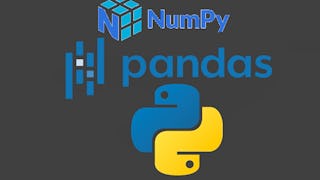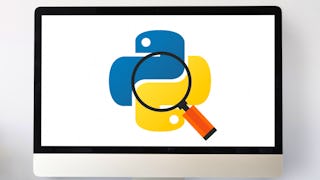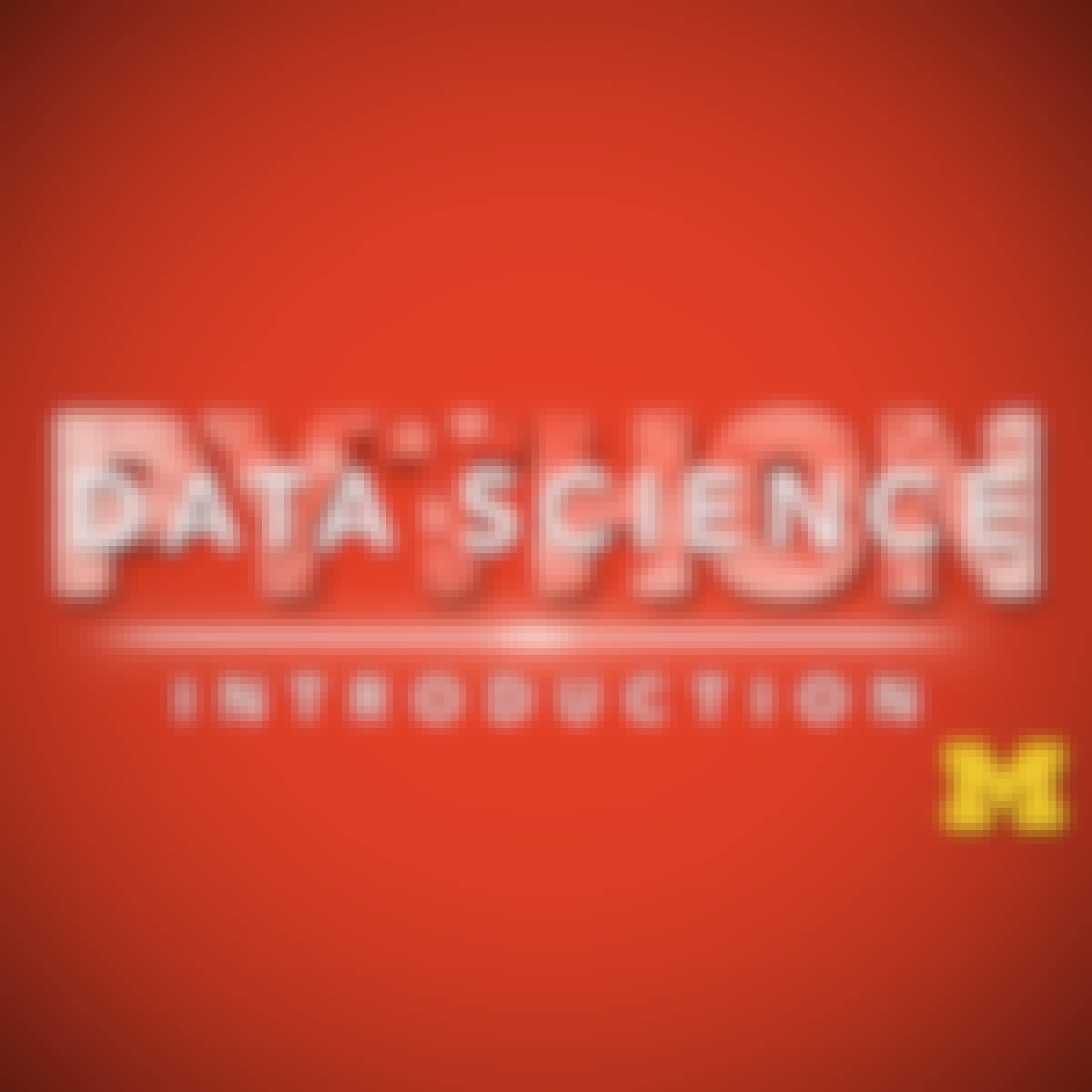- Browse
- Python
Python Courses
Python courses can help you learn programming fundamentals, data analysis, web development, and automation techniques. You can build skills in writing clean code, debugging, and using libraries like Pandas and NumPy for data manipulation. Many courses also introduce frameworks such as Flask and Django for web applications, as well as tools like Jupyter Notebooks for interactive coding and visualization. These skills and tools are essential for tackling projects in data science, software development, and artificial intelligence.
Popular Python Courses and Certifications
 C
CCoursera
Skills you'll gain: Data Science, Web Applications, Python Programming, Programming Principles, Artificial Intelligence, Computer Programming, Scientific Visualization, Game Design
4.5·Rating, 4.5 out of 5 stars2.2K reviewsBeginner · Guided Project · Less Than 2 Hours
 Status: NewNewStatus: Free TrialFree Trial
Status: NewNewStatus: Free TrialFree TrialSkills you'll gain: Pandas (Python Package), NumPy, Data Manipulation, Data Preprocessing, Package and Software Management, Data Analysis, Data Transformation, Data Integration, JSON, Object Oriented Programming (OOP), Data Wrangling, Data Science, Python Programming, Computer Programming, Programming Principles, Data Import/Export, Software Design, Mathematical Software, Computational Logic, Data Structures
4.8·Rating, 4.8 out of 5 stars105 reviewsBeginner · Specialization · 3 - 6 Months

Skills you'll gain: Pandas (Python Package), NumPy, Data Analysis, Data Science, Python Programming, Data Structures, Exploratory Data Analysis, Data Manipulation, Computer Programming
4.5·Rating, 4.5 out of 5 stars382 reviewsBeginner · Guided Project · Less Than 2 Hours
 Status: Free TrialFree Trial
Status: Free TrialFree TrialSkills you'll gain: Dashboard, Web Scraping, Data Analysis, Data Presentation, Real Time Data, Data Visualization Software, Graphing, Pandas (Python Package), Data Science, Data Wrangling, Jupyter, Python Programming, Data Collection
4.5·Rating, 4.5 out of 5 stars4.9K reviewsIntermediate · Course · 1 - 4 Weeks
 Status: NewNewStatus: Free TrialFree TrialG
Status: NewNewStatus: Free TrialFree TrialGGoogle
Skills you'll gain: Package and Software Management, Data Science, Computer Programming, Mathematical Software
4.8·Rating, 4.8 out of 5 stars72 reviewsBeginner · Course · 1 - 4 Weeks
 Status: Free TrialFree TrialC
Status: Free TrialFree TrialCCorporate Finance Institute
Skills you'll gain: Matplotlib, Financial Data, Exploratory Data Analysis, Pandas (Python Package), Financial Analysis, Data Visualization Software, Statistical Analysis, Data Manipulation, NumPy, Seaborn, Data Analysis, Data Science, Data Transformation, Python Programming, Data Cleansing, Computer Programming
4.9·Rating, 4.9 out of 5 stars13 reviewsAdvanced · Course · 1 - 3 Months
What brings you to Coursera today?
 Status: Free TrialFree Trial
Status: Free TrialFree TrialSkills you'll gain: Data Storytelling, Data Visualization, Exploratory Data Analysis, Regression Analysis, Data Visualization Software, Data Presentation, Statistical Hypothesis Testing, Sampling (Statistics), Data Ethics, Feature Engineering, Logistic Regression, Model Evaluation, Data Analysis, Statistical Analysis, Tableau Software, Machine Learning, Object Oriented Programming (OOP), Data Science, Interviewing Skills, Python Programming
Build toward a degree
4.8·Rating, 4.8 out of 5 stars10K reviewsAdvanced · Professional Certificate · 3 - 6 Months
 Status: Free TrialFree Trial
Status: Free TrialFree TrialSkills you'll gain: Prompt Engineering, Apache Spark, PyTorch (Machine Learning Library), Large Language Modeling, Transfer Learning, Model Evaluation, Computer Vision, Retrieval-Augmented Generation, Unsupervised Learning, Generative Model Architectures, Generative AI, PySpark, Vision Transformer (ViT), Keras (Neural Network Library), LLM Application, Supervised Learning, Vector Databases, Machine Learning, Python Programming, Data Science
Build toward a degree
4.6·Rating, 4.6 out of 5 stars22K reviewsIntermediate · Professional Certificate · 3 - 6 Months
 Status: Free TrialFree TrialU
Status: Free TrialFree TrialUUniversity of Michigan
Skills you'll gain: Pandas (Python Package), Data Manipulation, NumPy, Data Cleansing, Data Transformation, Data Preprocessing, Data Science, Statistical Analysis, Pivot Tables And Charts, Data Analysis, Python Programming, Data Import/Export, Programming Principles
4.5·Rating, 4.5 out of 5 stars27K reviewsIntermediate · Course · 1 - 4 Weeks
 Status: Free TrialFree TrialU
Status: Free TrialFree TrialUUniversity of Pennsylvania
Skills you'll gain: Matplotlib, Data Analysis, Pandas (Python Package), Data Visualization, Data Science, Data Cleansing, Pivot Tables And Charts, Data Visualization Software, Data Preprocessing, Data Manipulation, Scatter Plots, NumPy, Exploratory Data Analysis, Jupyter, Data Import/Export, Histogram, Python Programming, Data Structures, Programming Principles
4.5·Rating, 4.5 out of 5 stars429 reviewsBeginner · Course · 1 - 4 Weeks
 Status: Free TrialFree Trial
Status: Free TrialFree TrialSkills you'll gain: Dashboard, Web Scraping, SQL, Descriptive Statistics, Data Visualization, Statistical Analysis, Jupyter, Probability Distribution, Data Analysis, R (Software), Statistics, Statistical Hypothesis Testing, Data Science, Statistical Programming, Relational Databases, Stored Procedure, R Programming, Data Import/Export, Programming Principles, Python Programming
Build toward a degree
4.6·Rating, 4.6 out of 5 stars75K reviewsBeginner · Specialization · 3 - 6 Months
 Status: Free TrialFree TrialI
Status: Free TrialFree TrialIIBM
Skills you'll gain: Prompt Engineering, Prompt Patterns, Software Development Life Cycle, Retrieval-Augmented Generation, Software Architecture, Computer Vision, LangChain, ChatGPT, Restful API, Responsive Web Design, LLM Application, Generative AI, Responsible AI, IBM Cloud, Data Import/Export, AI Workflows, Python Programming, Engineering Software, Machine Learning, Data Science
Build toward a degree
4.6·Rating, 4.6 out of 5 stars81K reviewsBeginner · Professional Certificate · 3 - 6 Months
What brings you to Coursera today?
In summary, here are 10 of our most popular python courses
- Introduction to Python: Coursera
- Google Data Analysis with Python: Google
- Python for Data Analysis: Pandas & NumPy: Coursera
- Python Project for Data Science: IBM
- Hello, Python!: Google
- Python Fundamentals: Corporate Finance Institute
- Google Advanced Data Analytics: Google
- IBM AI Engineering: IBM
- Introduction to Data Science in Python: University of Michigan
- Data Analysis Using Python: University of Pennsylvania
Frequently Asked Questions about Python
Python is a versatile programming language known for its readability and simplicity. It is widely used in various fields, including web development, data analysis, artificial intelligence, and scientific computing. Its importance lies in its ability to empower individuals and organizations to automate tasks, analyze data, and create applications efficiently. As technology continues to evolve, Python remains a crucial skill for anyone looking to thrive in the digital landscape.
With Python skills, you can pursue various job roles, including software developer, data analyst, data scientist, machine learning engineer, and web developer. These positions are in high demand across industries, as companies seek professionals who can leverage Python for data-driven decision-making and automation. Additionally, roles in cybersecurity and artificial intelligence are increasingly looking for candidates with Python expertise.
To learn Python effectively, you should focus on several key skills. Start with the basics of programming, including syntax, data types, and control structures. Understanding libraries and frameworks, such as Pandas for data manipulation and Flask for web development, is also essential. Additionally, familiarity with version control systems like Git and knowledge of databases can enhance your Python proficiency.
There are many excellent online Python courses available. For beginners, the BiteSize Python for Absolute Beginners Specialization offers a gentle introduction. For those looking to advance their skills, the AI and Machine Learning Essentials with Python Specialization provides a solid foundation in applying Python to AI. Additionally, the Data Analysis with Python Specialization is great for those interested in data science.
Yes. You can start learning python on Coursera for free in two ways:
- Preview the first module of many python courses at no cost. This includes video lessons, readings, graded assignments, and Coursera Coach (where available).
- Start a 7-day free trial for Specializations or Coursera Plus. This gives you full access to all course content across eligible programs within the timeframe of your trial.
If you want to keep learning, earn a certificate in python, or unlock full course access after the preview or trial, you can upgrade or apply for financial aid.
To learn Python, begin by choosing a structured course or specialization that matches your skill level. Dedicate time to practice coding regularly, as hands-on experience is crucial. Utilize online resources, such as forums and coding communities, to seek help and collaborate with others. Finally, work on personal projects to apply what you've learned and reinforce your skills.
Typical topics covered in Python courses include basic syntax, data structures (like lists and dictionaries), control flow (if statements, loops), functions, and modules. Advanced courses may explore object-oriented programming, web development frameworks, data analysis libraries, and machine learning techniques. This comprehensive curriculum ensures you gain a well-rounded understanding of Python.
For training and upskilling employees, the Google IT Automation with Python Professional Certificate is an excellent choice, as it focuses on practical skills for IT professionals. Additionally, the Microsoft Python Development Professional Certificate provides a robust foundation for those looking to enhance their programming capabilities in a corporate environment.










